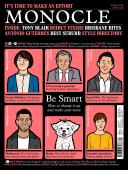
Issue 142
Monocle’s April issue is all about smartening up – this means everything from your business to your plans and your wardrobe. We sit down with a bumper crop of interviewees who are thinking big, from the UN secretary-general to the Estonian prime minister and Tony Blair to key players in the design and fashion industry. We revisit Beirut to see how this resilient city has rebuilt after the blast and press for answers behind the scenes at a key Hong Kong newspaper. Elsewhere we have a dashing style survey to keep you looking dapper this season, a sunny preview of our book about Italy and plenty in the way of recipes, recommendations and reportage.
In This Issue
Oops! No content was found.
Looks like we no longer have content for the page you're on. Perhaps try a search?
Return Home

